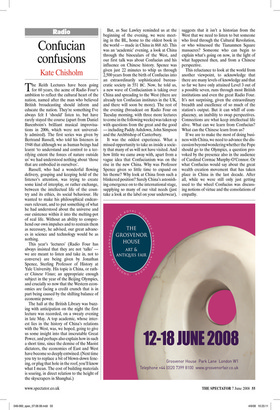Confucian confusions
Kate Chisholm
The Reith Lectures have been going for 60 years, the acme of Radio Four’s ambition to reflect the cultural heart of the nation, named after the man who believed British broadcasting should inform and educate the nation. They’re something I’ve always felt I ‘should’ listen to, but have rarely stayed the course (apart from Daniel Barenboim’s brilliant musical improvisations in 2006, which were not universally admired). The first series was given by Bertrand Russell, who told his listeners in 1948 that although we as human beings had learnt ‘to understand and control to a terrifying extent the forces of nature outside us’ we had understood nothing about ‘those that are embodied in ourselves’.
Russell, who had a wonderful flowing delivery, grasping and keeping hold of the listener’s attention, was trying to create
Spe
some kind of interplay, or rather exchange, between the intellectual life of the country and its ethics, its social behaviour. He wanted to make his philosophical endeavours relevant, and to put something of what he had understood about the universe and our existence within it into the melting-pot of real life. Without an ability to comprehend our own impulses and to restrain them as necessary, he advised, our great advances in science and technology would be as nothing.
This year’s ‘lectures’ (Radio Four has always insisted that they are not ‘talks’ — we are meant to listen and take in, not to converse) are being given by Jonathan Spence, Sterling Professor of History at Yale University. His topic is China, or rather Chinese Vistas; an appropriate enough subject in the year of the Beijing Olympics, and crucially so now that the Western economies are facing a credit crunch that is in part being caused by the shifting balance of economic power.
The hall at the British Library was buzzing with anticipation on the night the first lecture was recorded, on a sweaty evening in late May. A top academic, whose interest lies in the history of China’s relations with the West, was, we hoped, going to give us some insight into that inscrutable Great Power, and perhaps also explain how in such a short time, since the demise of the Maoist dictators, the economies of East and West have become so deeply entwined. (Next time you try to replace a bit of blown-down fencing, or plug that hole in the roof, you’ll know what I mean. The cost of building materials is soaring, in direct relation to the height of the skyscrapers in Shanghai.) But, as Sue Lawley reminded us at the beginning of the evening, we were meeting in the BL, home to the oldest book in the world — made in China in 868 AD. This was an ‘academic’ evening, a look at China through the binoculars of the West, and our first talk was about Confucius and his influence on Chinese history. Spence was given just 22 minutes to whip us through 2,500 years from the birth of Confucius into an extraordinarily sophisticated bureaucratic society in 551 BC. Now, he told us, a new wave of Confucianism is taking over China and spreading to the West (there are already ten Confucian institutes in the UK, and there will soon be more). The rest of the evening (broadcast on Radio Four on Tuesday morning, with three more lectures to come in the following weeks) was taken up with questions from the great and the good — including Paddy Ashdown, John Simpson and the Archbishop of Canterbury.
It was the oddest experience. What a missed opportunity to take us inside a society that many of us will not have visited. And how little we came away with, apart from a vague idea that Confucianism was on the rise in the new China. Why was Professor Spence given so little time to expand on his theme? Why look at China from such a
ator 12page 17/4/08 14:37 Page
blinkered position? Surely China’s astonishing emergence on to the international stage, supplying so many of our vital needs (just take a look at the label on your underwear), suggests that it isn’t a historian from the West that we need to listen to but someone who lived through the Cultural Revolution, or who witnessed the Tiananmen Square massacres? Someone who can begin to explain what’s going on now, in the light of what happened then, and from a Chinese perspective.
This reluctance to look at the world from another viewpoint, to acknowledge that there are many levels of knowledge and that so far we have only attained Level 3 out of a possible seven, runs through most British institutions and even the great Radio Four. It’s not surprising, given the extraordinary breadth and excellence of so much of the station’s output. But it can whiff of complacency, an inability to swap perspectives. Connections are what keep intellectual life alive. What can we learn from Confucius? What can the Chinese learn from us?
If we are to make the most of doing business with China, we need to advance the discussion beyond wondering whether the Pope should go to the Olympics, a question provoked by the presence also in the audience of Cardinal Cormac Murphy-O’Connor. Or what Confucius would say about the great wealth creation movement that has taken place in China in the last decade. After all, while we were still only just getting used to the wheel Confucius was discussing notions of virtue and the consolations of empathy.










































































 Previous page
Previous page